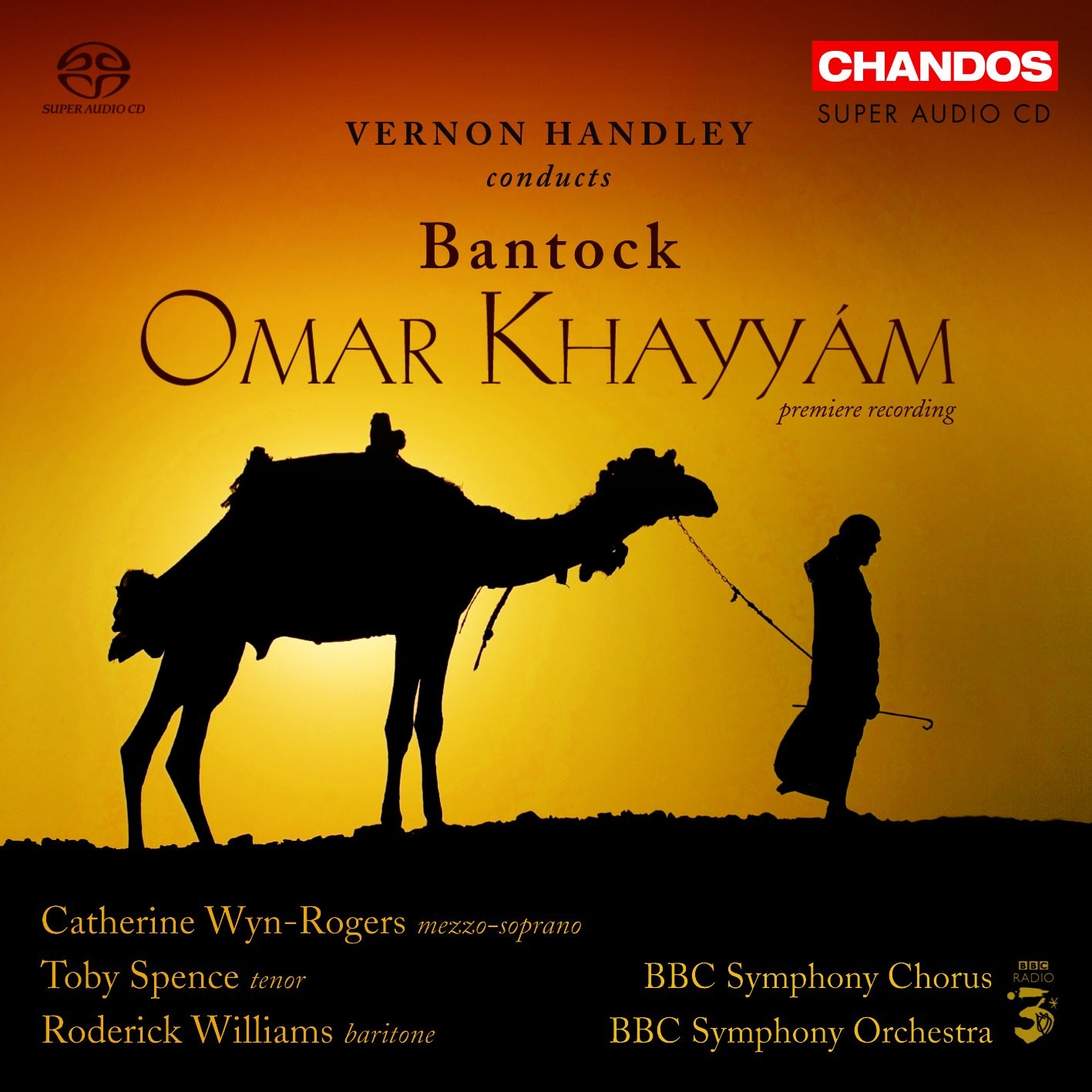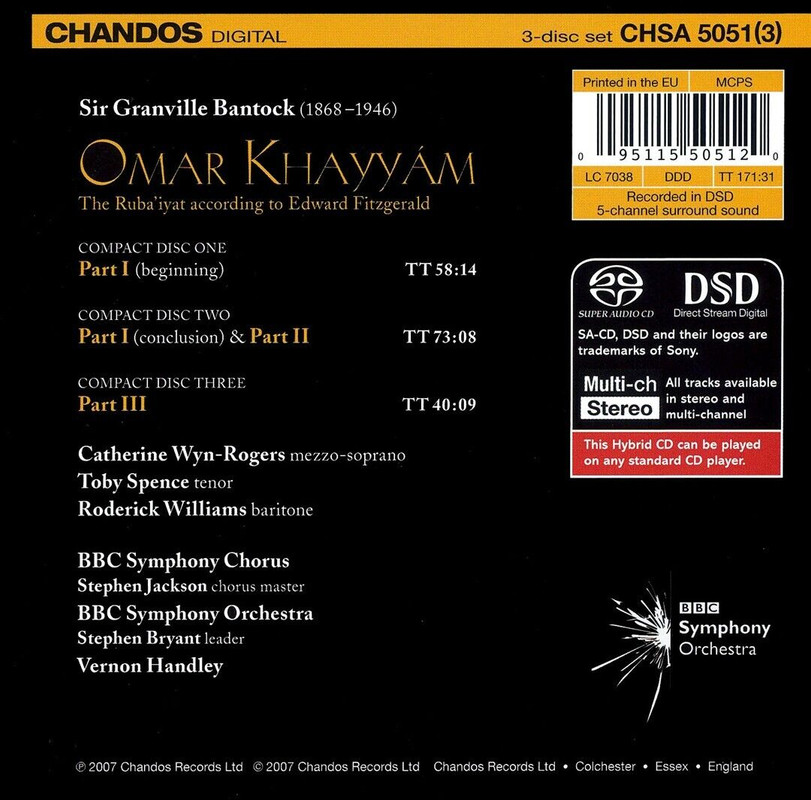The Horrors of Poetic Translations
Nor Whence, like water willy-nilly flowing;
And out of it, as wind along waste,
I know not Whither, willy-nilly blowing.
I wonder what original Persian texts from Omar Khayyám warranted Fitzgerald's use of willy-nilly. It is such an unusual choice, and really takes me out of the moment. Of course, the more I read these lines, the more confused I become. Lovers of the King James Bible will have much to enjoy.
If you do not know, quatrains of poetry have been attributed to astronomer-poet Omar Khayyám, verse prized for its agnostic and Humanist viewpoints. Following the popularity of Fitzgerald's Victorian Era translations, British composer Sir Granville Bantock set the writings to music.
The result is a lengthy song cycle-cum-cantata set in a late-Romantic musical style. If I have often used the adjectives lush, atmospheric, swollen, turgid, and luscious to previously describe the orchestral music of Bantock, all of them would duly apply to this nearly three-hour epic.
For me, the most effective portions are the choral numbers, where Bantock really brings out the meaning of Khayyám's tent-making ideas:
Of this and that endeavor and dispute;
Better be jocund with the fruitful grape
Than sadden after none, or bitter, fruit.
OR
Oh threat of Hell and hopes of Paradise!
One thing is at least certain - This life flies;
One thing is certain and the rest is lies;
The flower that once has blown for ever dies.
OR
A blessing, we should use it, should we not?
And if a curse - why, then, Who set it there?
These were just a few lines which struck me as I followed along. The idea of who sets limits on what gives an individual pleasure is a curious idea from so long ago. Personally, I believe the only one responsible for my own happiness, contentment, sorrow, or displeasure lies wholly on me as an individual - that is, I do not reward or blame any religious or governmental entity for my successes or failures in life. Nor do I rely on others' criticisms of my belief system to deter me from what it is which brings me joy and satisfaction.
Now, think of such thoughts from an 11th-Century, Fertile-Crescent scientist, where such personal religious and ethical implications must have been met with severe consequences.
Well, I have digressed from this recording too far, methinks. As I have mentioned, the chorus numbers contain the big moments of both textual and musical direction. Bantock sets the conversation of ideals to three soloists: The Beloved from a mezzo, The Poet from a tenor, both of whom insinuate some sensuality, and The Philosopher sung by baritone, who really wants nothing more than to have a drink whenever he wants.
The best moments for me are when the mezzo and tenor duet, or when everyone comes together. The baritone probably has the most 'fun' solo settings in his quest for the eternal tavern. Yet, the solos are all rather perfumed and lyrical for the most part, and Bantock's ever unresolved, chromatic-harmonic wanderings go on and on.
There is a fair bit on tap for orchestra as well. Orchestral preludes and interludes exist between each solo and chorus, although most are spice-laden wafts of exotic airiness and wind solos. Again, late-Romanticism isn't always my favorite musical style, which at lengths such as this, can test my patience.
As is usually the case with Chandos, the entire outfit is captured about mid-hall with a fair bit of acoustic ambiance, aiding the work in its lush, rich musical portrayal. Vernon Handley, who has six volumes of Bantock's orchestral music on Hyperion, is just as adept, but since the sound isn't as forward, sounds slightly gauzy in a Delius-type Impressionist manner.
I doubt Handley's vocal soloists stand up to Del Mar's starry cast. Because the mic placement is further away, we don't get overly detailed singing from Roderick Williams, who can so often make the English language special. Otherwise, Catherine Wyn-Rogers and Toby Spence are generally delightful to listen to, especially when they duet.
Let us get to the matter of cuts. Vernon Handley chooses about 20-30 minutes worth of cuts in Parts I and II, where Chandos fits them onto 3CDs. Most of these cuts are choral numbers, which is unfortunate since these are my favorite portions. Some instrumental moments are cut as well, such as the Prelude to Part II, and a few of the Poet's solos are skipped in Part II too. Norman Del Mar performs the complete work, but that recording is saddled with four CDs, where Lyrita adds Bantock's Fifine at the Fair, Pierrot of the Minute, and Sappho, which I already own on other recordings.
Oddly, Del Mar's Omar Khayyám without cuts times almost exactly as Handley's on Chandos with cuts. Handley's Part I is already around 90 minutes, while the other parts run around 40 minutes each. Obviously, Del Mar moves things along hastily (and excitingly), while Handley smells the roses more often than not, allowing Bantock's lush, ooey-gooey soundworld to bask in the sun.
Where do I stand? Norman Del Mar's recording could easily be a favorite of mine, for I like that older, closer recording perspective. Vernon Handley's is incomplete, but allows the music time to romance the listener and unfurl like a flower. I guess, if you want the other orchestral works from Bantock, Lyrita's would be my first choice. Handley's stands second, mainly due to its incomplete status - I wonder if this choice was budgetary or time related. Too bad, although it must be said, this Chandos recording is a knockout as well.
Works
Omar Khayyám
Part I (1.27.10)
Part II (44.12)
Part III (40.09)
Soloists
Catherine Wyn-Rogers, mezzo
Toby Spence, tenor
Roderick Williams, baritone
Performers
BBC Symphony Chorus
BBC Symphony Orchestra
Vernon Handley, conductor
Label: Chandos
Year: 2007
Total Timing: 2.51.31
I am not sure Omar Khayyám would ever rank to the very top of The Oozy Keep.
While the work is very long, I think it keeps my attention held just as well as Sappho, and probably more so than Bantock's Song of Songs.
Del Mar's recording on Lyrita might be the best way to be introduced to this music, but Handley's on Chandos is just as fine, merely presented differently. Both are complementarily effective performances.




Comments
Post a Comment